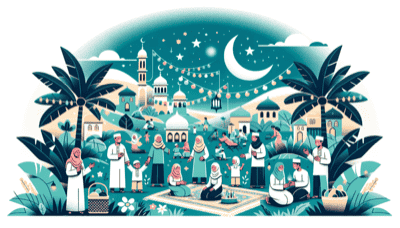We're here to help you keep count of the days to or since a date. Just click the button below and enter your chosen date to get started. Also choose the suggested days or search for a special day above #countingthedays

Eid al-Fitr, known as the "Festival of Breaking the Fast," is a significant religious holiday celebrated by Muslims in Comoros, marking the end of Ramadan, the Islamic holy month of fasting.
The origins of Eid al-Fitr are traced back to the Prophet Muhammad, who established this day as a time for Muslims to express gratitude to Allah for the strength given to them during Ramadan. In Comoros, an island nation with Islam being the predominant religion, this day is deeply embedded in the cultural and religious fabric of society.
On Eid al-Fitr, people in Comoros begin their day with a special communal prayer called Salat al-Eid which is performed in large open spaces or mosques across the islands. The prayer is usually done early in the morning and is followed by a sermon where forgiveness, peace, and unity are emphasized.
Before attending prayers, it is customary to perform Ghusl (ritual purification), wear new or clean clothes symbolizing renewal and cleanliness, and eat a small breakfast as a sign that fasting has ended.
Charity is an important aspect of Eid al-Fitr in Comoros. Zakat al-Fitr or fitrana, an obligatory act of charity given to the poor at the end of Ramadan, allows everyone to partake in the celebrations.
After prayers, people visit friends and family members to exchange greetings such as "Id Mubarak" or "Eid Saïd." Homes are usually prepared to receive guests with special decorations and an array of food. Common dishes enjoyed during Eid include meat dishes like grilled fish or goat because it's one of the few times during the year when many consume meat due to its cost. Sweet treats such as madafu (young coconut), ladu (coconut balls), and various types of pastries are also popular.
Children often receive gifts or money from elders which adds to their excitement for Eid. Throughout Comoros' islands – Grande Comore (Ngazidja), Mohéli (Mwali), Anjouan (Ndzuwani) – cultural dances and public festivities may be observed as part of community celebrations.
Note: The exact date of Eid al-Fitr varies each year according to lunar sightings which determine when Ramadan ends.